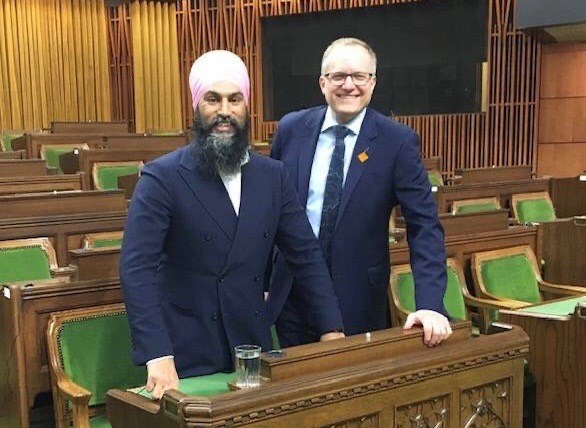New Westminster-Burnaby MP Peter Julian says the NDP will continue to press the federal government to ensure Canadians get the supports they need during the pandemic.
On Oct. 6, the minority Liberal government survived a confidence vote when the NDP supported the speech from the throne, which introduces the government’s directions and goals. Conservative, Bloc Quebecois and Green MPs voted against the throne speech, which passed 177 to 152.
The speech, delivered Sept. 23, outlined the Liberals’ plans for responding to issues such as COVID-19, child care, climate change and health care.
“The reality is Justin Trudeau has had numerous throne speeches that have been beautiful words on paper, but he has never followed up with the action. The throne speech itself was fine, but it’s meaningless. What’s meaningful is the legislation, it’s the actual actions, it’s the investment that comes through a budget or economic update,” Julian told the Record. “We are going to keep pushing for the government to make these investments. … As long as we can get things done for people, that’s our main focus. We are just going to continue to push so people get the supports that they need.”
The NDP supported the throne speech after the Liberal government addressed some of its concerns, such as extending benefits for workers negatively impacted by COVID-19 and introducing 10 paid sick days for Canadians who can’t go to work because of the pandemic.
The Liberals had proposed decreasing the emergency response benefit from $500 to $400 a week for unemployed Canadians.
“One of the things we fought for, and succeeded in getting, was no reduction in what people were getting through the emergency response benefit,” Julian said. “We know that people are really having difficulty putting food on the table, paying their rent, keeping a roof over their head, so we didn’t want to see a reduction. We pushed hard, and then the government finally conceded. So the $500 a week will continue.”
Julian said sick leave for workers is a “really important” issue for Canadians, as many people don’t have access to paid sick leave. He said he’s met a lot of constituents who, if they are sick, have to make tough choices; if they don’t work that day, they don’t get paid, which means they may not be able to put food on the table or pay their rent.
Canadians who can’t go to work because they’re ill now have 10 sick days, Julian said.
“That is historic, because for 150 years we haven’t had access to sick leave for workers who don’t have that as part of their employment contract,” he said. “Not only does this help the individuals, it also helps the small businesses in Burnaby and New Westminster who haven’t been able to pay for sick leave but now their employees have access to it.”
While the Liberals’ plan is for the sick-day legislation to be temporary, Julian said the NDP will be “pushing hard” to make it permanent.
“It will last until September 2021, through what we believe to be most of the pandemic, hopefully all of the pandemic if a vaccine is available next spring,” he said. “But we really need to have these provisions in the longer term because these outbreaks happen. … We need to make sure that the protections are in place. Paid sick leave is one way of protecting everybody. The employees. The fellow employees in the workplace. The small businesses. Everybody in the community is more protected when people can stay home when they are sick rather than having to go to work.”
After a three-week stint with the NDP caucus in Ottawa, Julian is returning to New Westminster for a while. He noted a “hybrid Parliament” is currently in place, with most MPs participating virtually from across Canada in an effort to lessen the possibility of MPs catching and transmitting COVID-19.
While he won’t be in Ottawa, Julian said he will join his NDP colleagues in pressing the government to release a budget or an economic update. He wants Canada to introduce a “wealth tax” so everyone is paying their fair share.
“We have seen over the last six months, Canada’s wealthiest billionaires increasing their wealth by tens of billions of dollars – $37 billion is the latest estimate for the top 20 Canadian billionaires, and they pay virtually no taxes,” he said. “So part of our work in the coming weeks is to put in place a wealth tax, to crack down on the tax havens so we have the wherewithal to make investments to help people.”



